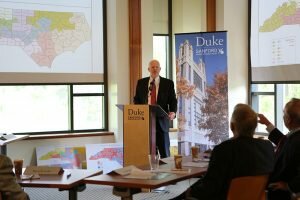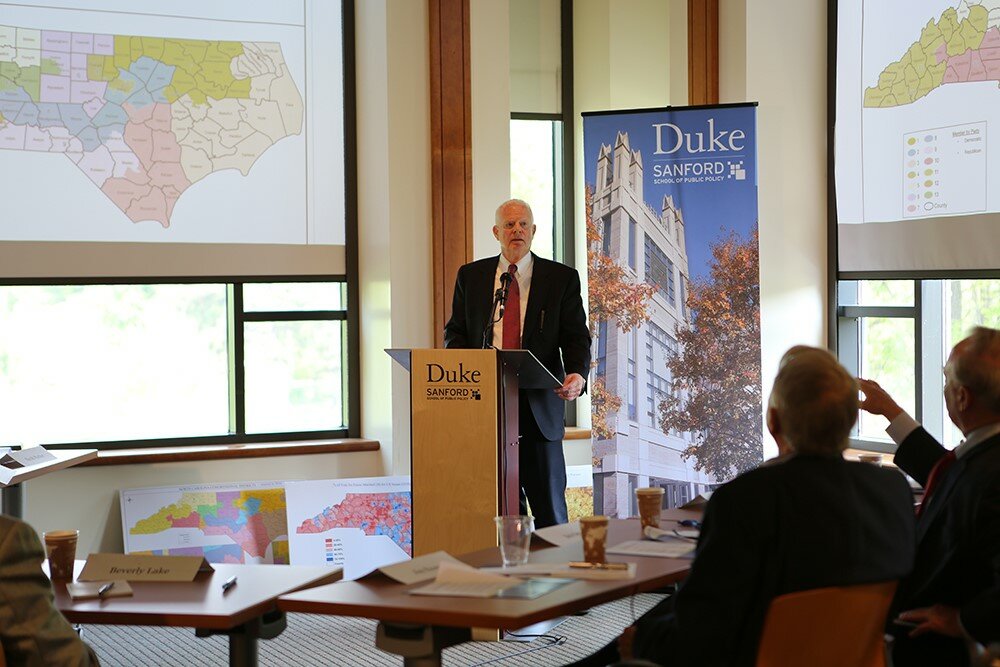Taking the politics out of redistricting in N.C.
|

Bill Gilkeson, who served 25 years on the legal staff of the General Assembly, speaks at Thursday’s event.
By Eric Ferreri and Steve Hartsoe
Removing politics from redistricting — the practice of redrawing boundaries of districts from which public officials are elected — could produce more candidates for elected office in North Carolina and boost public confidence in government.
That was the gist of a day-long discussion Thursday at Duke involving former North Carolina judges, academics, a demographer, legislative attorney and political advocates.
The event at the Sanford School of Public Policy was the first of three that ultimately will result in a new, but unofficial, map of N.C. congressional districts.
The project is designed to increase public understanding of how independent political redistricting might function in North Carolina if adopted.
“This project will model a bipartisan redistricting commission without considering partisan politics – – to see what that’s like,” said Thomas Ross, Terry Sanford Distinguished Fellow at the Sanford School. “We are not here to try to influence the outcome of any court decision. … Our purpose is education.”
Ross, who stepped down recently as president of the University of North Carolina system, is a former state superior court judge. He enlisted 10 other retired judges from the state to take part in the redistricting exercise.
Redistricting is the process of redrawing boundaries of districts from which public officials are elected. Based on U.S. Census data, districts are updated every 10 years to reflect population shifts.
The N.C. General Assembly is responsible for creating maps for the state’s 13 U.S. House of Representatives districts, 50 N.C. Senate districts and 120 N.C. House of Representatives districts.
The state’s congressional maps, last drawn in 2011, were disputed. A federal court threw out those maps in February, saying Districts 1 and 12 were racially gerrymandered. The ruling forced the General Assembly to redraw the districts and delayed the state’s congressional primaries from March to June.
In a parallel dispute, a panel of three judges is considering whether nearly 30 of 170 N.C. state House and Senate districts were racially gerrymandered and must be redrawn.
Speakers at Thursday’s event noted that several other states rely on independent commissions to handle redistricting, which they said limits the influence of politics on how those districts are redrawn.
“We can’t draw every district to be competitive, but we can certainly do better,” said Bob Phillips, executive director of Common Cause North Carolina, a co-sponsor of Thursday’s event along with POLIS: The Center for Politics, Leadership, Innovation & Service at Duke.
“There are some states that have shown you can draw fair maps and fair districts. But when you have things like uncontested districts, that means it’s hard for a citizen to feel they have a voice,” Phillips said. “And it’s difficult for the elected official to feel they’re being held accountable. … That’s harmful for democracy.”
He noted that in one recent election some 42 percent of legislative districts were uncontested. In 2014, he said, nearly 90 percent of 170 members of the General Assembly ran uncontested or won by a double-digit margin.
“The closest race was decided by about 15 percent,” Phillips said.
Both Democrats and Republicans are guilty of redrawing districts for political gain, a practice called “gerrymandering,” speakers said.
“It is something everyone acknowledges is wrong. But it’s hard to give up the power,” Phillips said.
In a lively back-and-forth lunchtime discussion, John Hood, of the right-leaning John Locke Foundation, and Chris Fitzsimon, of the left-leaning N.C. Policy Watch, agreed on the need for redistricting reform in North Carolina.
Fitzsimon said that while redistricting has historically not been an exciting topic for voters to embrace, there may be an opening right now in North Carolina because the court challenges have given it higher-than-usual visibility.
Hood said those who are lobbying Republicans — the party wielding political power in Raleigh — should push the notion of fairness in voting. It may yield results since Republicans, who took control of both houses of state government in 2010, have long memories and recall well the days when Democrats used their powers to gerrymander, too.
“Isn’t it fair that if you got 40 percent or 45 percent of the vote, you ought not have 20 percent of the seats?” Hood said. “Think psychologically, not just intellectually. How do we get people to consider taking a risky position? Emphasize fairness.”
—
Other stories on N.C. redistricting
Mathematicians’ study bolsters call for non-partisan redistricting reform
Guy-Uriel Charles: Redistricting reconsidered
Redistricting in North Carolina: A personal perspective


